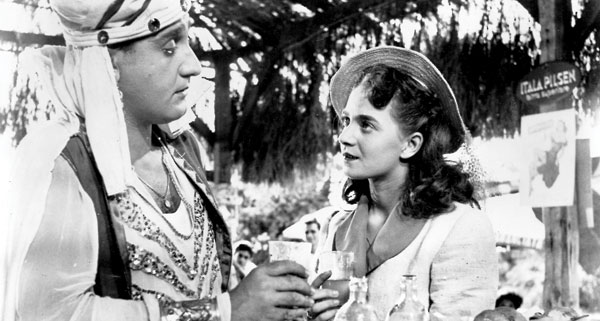 In The White Sheik, Fellini comments on the relationship between reality and illusion, while also satirizing movie making itself, its essential fakeness, but also its seductive charm.
In The White Sheik, Fellini comments on the relationship between reality and illusion, while also satirizing movie making itself, its essential fakeness, but also its seductive charm.
Among the films of Federico Fellini are a few that have achieved classic status, and deservedly so, such as La Strada, La Dolce Vita, and 8 ½. But hidden among these masterpieces are smaller and lesser known gems that deserve to be seen. Fellini’s first film, the delightful Variety Lights, which I’ve reviewed on this show before, was co-directed with Alberto Lattuada. I recently watched his first solo effort as a director, from 1952, entitled The White Sheik. Once again, the wit and freshness of early Fellini is a joy to behold.
The producers wanted to do a satire on photo-comic books, serials based on popular films that were current at the time, and basically expose them as the trashy pseudo-novels that we were, but Fellini had started out writing for a humor magazine in Rome, and his lifelong affection for comic books and strips of all kinds made The White Sheik more of an amusing tribute than a hostile attack.
The story concerns Wanda, a young newlywed played by Brunella Bovo, a serious fan of these photo comic strips, and especially her favorite one about a hero of Arabian romance known as “The White Sheik.” Her new husband, Ivan, an officious little clerk, takes her to Rome on their honeymoon. His uncle is an official at the Vatican and they’ve been secured an audience with the Pope. In Rome, Wanda knows that the crew of the new White Sheik movie is shooting just a few blocks from the hotel. While her husband is napping, she sneaks out. Her plan is to meet her idol, Fernando Rivoli, who plays the White Sheik, present him with a picture she has drawn of him, and then sneak back. But instead she gets drawn into the film’s exciting entourage, and ends up traveling with them to a location on the sea shore, where she watches filming and even gets to be in a scene, while Rivoli, who sees her as an easy mark, sets out to seduce her. She ends up stuck miles away on this location for the entire day. Meanwhile the husband’s family shows up, and he has to pretend she is sick while he goes with them around town, all the time desperately hoping for her return.
The White Sheik himself, Rivoli, is played by Alberto Soldi, a veteran of numerous popular Italian comedies. The idol, of course, has feet of clay. In contrast to the romantic hero he plays in the films and comic strips, Rivoli is an insecure, pretentious woman-chaser, and he’s not very bright, either. There is a lot of bittersweet humor in the interactions between the innocent Wanda and the Sheik, while surrounded by an assortment of supporting actors, directors, hangers-on, and lunatics. Leopoldo Trieste, a writer who only acted occasionally to make a living, nails the part of the husband, Ivan, whose escalating discomfort springs from his obsessive concern with performing a proper social role, making the right impression, and family honor.
The crisp black and white cinematography is by the great Arturo Gallea, who’d been shooting films since the silent era. The music is by Nino Rota—Fellini was so pleased with Rota that he ended up hiring him to do the music for all of his films.
Now, Fellini’s comic point of view is pretty dark here. Both the wife and the husband are more invested in fantasy than reality—she on romance and glamour, and he on status and respectability. They don’t really see each other in the midst of all their anxious dreaming and wishing. In addition to commenting on the funny yet sad relationship between reality and illusion, The White Sheik also pokes fun at movie making itself, its essential fakeness, but also its seductive charm.

Olivier Assayas portrays the complex and somewhat devious relationships of a group of Parisian literary types, in a film that poses questions about traditional...

I’ve mentioned before how films will come and go, sometimes disappearing after only a week, so that I don’t have a chance to review...

Jane Campion’s first film in twelve years examines deceptive notions of manhood on a cattle ranch in 1920s Montana. New Zealand filmmaker Jane Campion...